Module 11 Body language Unit 1 They touch noses! 知识点课件(共15张PPT,无音频,WPS打开)
文档属性
| 名称 | Module 11 Body language Unit 1 They touch noses! 知识点课件(共15张PPT,无音频,WPS打开) |
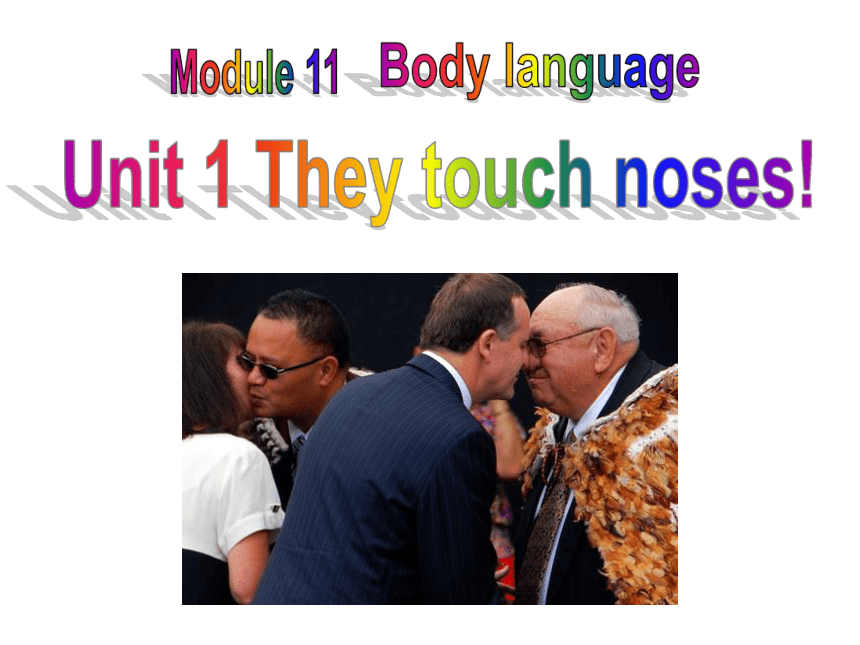
|
|
| 格式 | ppt | ||
| 文件大小 | 2.2MB | ||
| 资源类型 | 教案 | ||
| 版本资源 | 外研版 | ||
| 科目 | 英语 | ||
| 更新时间 | 2020-06-10 00:00:00 | ||
图片预览

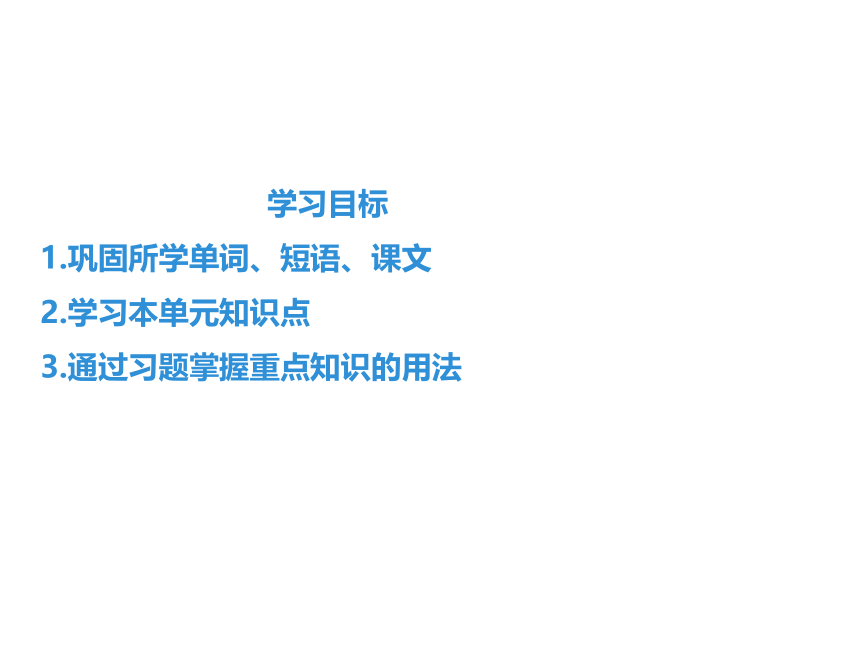

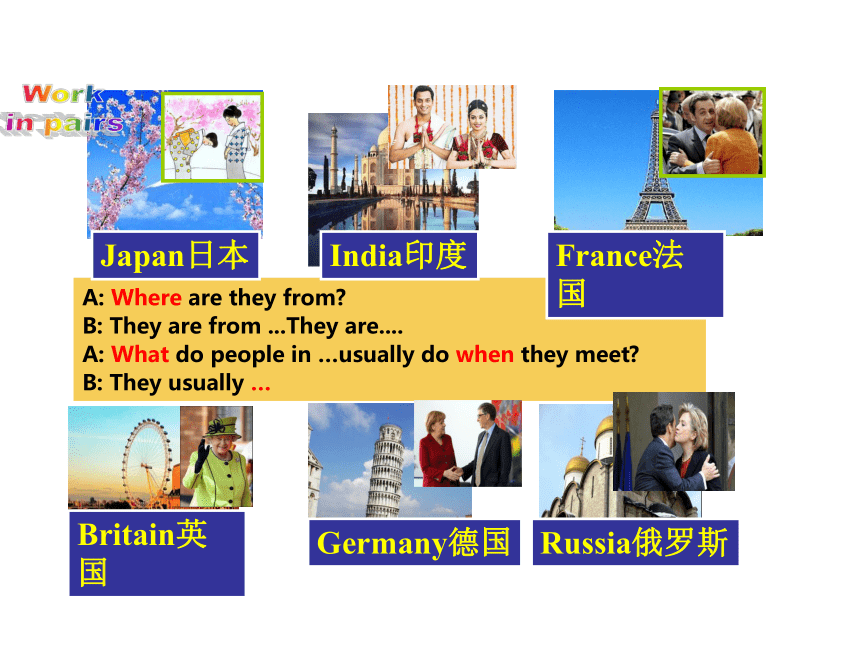
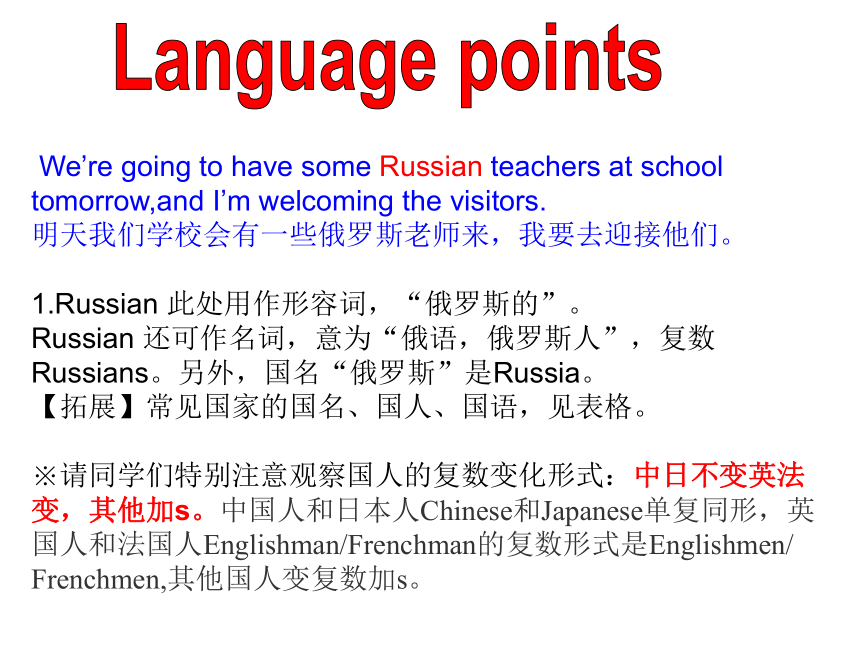
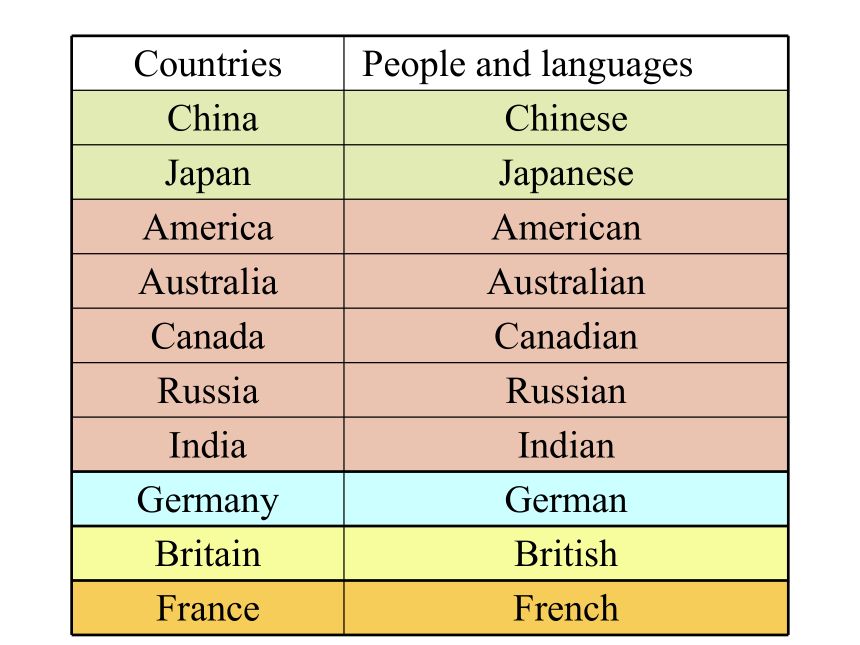
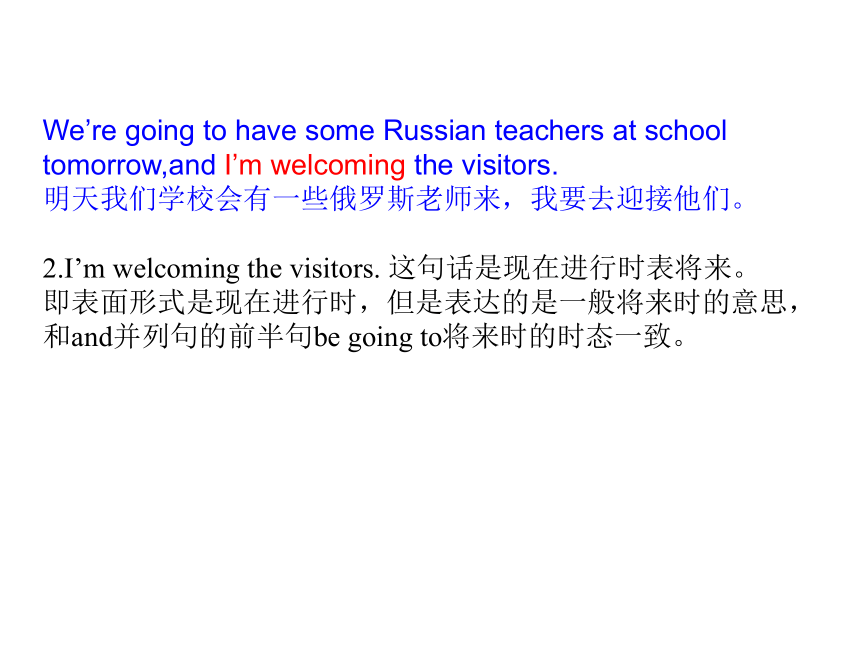
文档简介
(共15张PPT)
Unit 1 They touch noses!
Body language
Module 11
学习目标
1.巩固所学单词、短语、课文
2.学习本单元知识点
3.通过习题掌握重点知识的用法
India kiss Russia together touch visitor
In China, people shake hands and smile.
American people shake hands and sometimes (1) ______.
Now complete the table with the correct form of the words from the box.
In (2) ______, people put their hands (3) ________ and nod their heads. when they meet
(6) ________.
In (4) _______, people kiss each other three times. Maori people (5) ______ noses. kiss
India
together
Russia
touch
visitors
A: Where are they from
B: They are from ...They are....
A: What do people in …usually do when they meet
B: They usually …
Russia俄罗斯
France法国
Germany德国
Japan日本
India印度
Britain英国
Work
in pairs
We’re going to have some Russian teachers at school tomorrow,and I’m welcoming the visitors.
明天我们学校会有一些俄罗斯老师来,我要去迎接他们。
1.Russian 此处用作形容词,“俄罗斯的”。
Russian 还可作名词,意为“俄语,俄罗斯人”,复数Russians。另外,国名“俄罗斯”是Russia。
【拓展】常见国家的国名、国人、国语,见表格。
※请同学们特别注意观察国人的复数变化形式:中日不变英法变,其他加s。中国人和日本人Chinese和Japanese单复同形,英国人和法国人Englishman/Frenchman的复数形式是Englishmen/ Frenchmen,其他国人变复数加s。
Language points
Countries People and languages
China Chinese
Japan Japanese
America American
Australia Australian
Canada Canadian
Russia Russian
India Indian
Germany German
Britain British
France French
We’re going to have some Russian teachers at school tomorrow,and I’m welcoming the visitors.
明天我们学校会有一些俄罗斯老师来,我要去迎接他们。
2.I’m welcoming the visitors. 这句话是现在进行时表将来。
即表面形式是现在进行时,但是表达的是一般将来时的意思,和and并列句的前半句be going to将来时的时态一致。
…in Russia,people usually kiss three times …
3.time 此处用作可数名词,意为“次数”,three times意为“三次”。“一次”用once, “两次”用twice, 三次及以上用“基数词+times”。
如:
Take this medicine three times a day。这种药一天喝三次。
注意:对表示次数的词或短语提问要用how many times, 意为“多少次”。
[拓展]time可用作不可数名词,意为“时间”。提问时间点的句子如下:
What’s the time / What time is it 现在几点了?
We Chinese often shake hands and smile when we meet visitors,and sometimes we nod our heads.
我们中国人会见来访者时,通常是握手、微笑、有时候点头。
4. shake hands 表示“握手”。
shake hands with sb. 表示“和某人握手”。
shake-shook
他向我微笑,并和我握手。
He smiled at me and _____ _____ _____ me.
shook hands with
We Chinese often shake hands and smile when we meet visitors,and sometimes we nod our heads.
我们中国人会见来访者时,通常是握手、微笑、有时候点头。
5.smile 动词,意为“微笑”,
smile at sb. 意为“对某人微笑”,表示一种状态。
smile to sb也表示“对着某人微笑”,表示动作刚发生,暂时性动作。常见的还是smile at sb。
[拓展]smile还可用作名词,意为“微笑,笑容"
She had a big smile on her face. 她笑容满面。
That’s because people do different things in different countries.
那是因为不同国家的人民做法不同。
6.That's because…是一个常用句型,意为“那是因为……”,
that 表示刚提到的内容,because 后接表示原因的从句,该从句用陈述语序。
7.different 形容词,“不同的”+名词复数
difference名词,“不同”
… some kiss or hug each other.
8. each other意为“互相;彼此”。
each与every的区别
each 意为“各个;每个”,用于指两者或两者以上当中的每个。
作形容词,修饰单数名词,接单数动词。 Each student has a book.
作代词,单独使用,接单数动词;Each likes playing football.
作代词,放在复数名词和代词后,接复数动词。We each have a bike.
☆each可以与of连用,加名词复数,后面的谓语动词用单数。
Each of them has a dictionary.
every指三个或三个以上的人或事物的“全体”, 和all意思相近。
every只能作形容词,总是修饰单数名词,谓语动词用单数。
Every child is a gift from God.
every不能与of连用。
1.( ) ______of us_______ an English dictionary in our class.
A.Each;has B.Each;have C.Every;has D.Every;have
2.Each______(like) playing football.
A
likes
当堂检测1
1. We Chinese often ________ and smile when we meet visitors.
A. take photos B. get up C. shake hands D. hurry up
2. The boy turned around and _______ at me. That made me warm.
A. shouted B.smiled C. knocked D. pointed
3. Daming has been to Russia four_______.
A. times B. time C. days D. day
4. ---I’m told your class has 3 new comers.
--- Yes. One is a ________, and the other two are ________.
A. Japanese;German B. Japanese;Germans
C. Japanese;Germen D. Japan; Germany
5. ---Why are you late
---_______ I got up late.
A. That’s why B. This is why
C. That’s why D. That’s because
C
B
A
B
D
1.A lot of __________(visit) visit the Great Wall every year.
2.Kitty can speak Chinese but she can't speak _________(Japan).
3.—Where does your friend come from
—She comes from __________(Russian).
4.There are some __________(German) in the big company.
5.Look! The two monkeys __________(hug) over there.
当堂检测2
visitors
Japanese
Russia
Germans
are hugging
homework
1.整理今天学的知识点及错题
2.完成发的试卷
3.百词斩(一周一统计,打卡一天加1分,连续七天加10分)
Unit 1 They touch noses!
Body language
Module 11
学习目标
1.巩固所学单词、短语、课文
2.学习本单元知识点
3.通过习题掌握重点知识的用法
India kiss Russia together touch visitor
In China, people shake hands and smile.
American people shake hands and sometimes (1) ______.
Now complete the table with the correct form of the words from the box.
In (2) ______, people put their hands (3) ________ and nod their heads. when they meet
(6) ________.
In (4) _______, people kiss each other three times. Maori people (5) ______ noses. kiss
India
together
Russia
touch
visitors
A: Where are they from
B: They are from ...They are....
A: What do people in …usually do when they meet
B: They usually …
Russia俄罗斯
France法国
Germany德国
Japan日本
India印度
Britain英国
Work
in pairs
We’re going to have some Russian teachers at school tomorrow,and I’m welcoming the visitors.
明天我们学校会有一些俄罗斯老师来,我要去迎接他们。
1.Russian 此处用作形容词,“俄罗斯的”。
Russian 还可作名词,意为“俄语,俄罗斯人”,复数Russians。另外,国名“俄罗斯”是Russia。
【拓展】常见国家的国名、国人、国语,见表格。
※请同学们特别注意观察国人的复数变化形式:中日不变英法变,其他加s。中国人和日本人Chinese和Japanese单复同形,英国人和法国人Englishman/Frenchman的复数形式是Englishmen/ Frenchmen,其他国人变复数加s。
Language points
Countries People and languages
China Chinese
Japan Japanese
America American
Australia Australian
Canada Canadian
Russia Russian
India Indian
Germany German
Britain British
France French
We’re going to have some Russian teachers at school tomorrow,and I’m welcoming the visitors.
明天我们学校会有一些俄罗斯老师来,我要去迎接他们。
2.I’m welcoming the visitors. 这句话是现在进行时表将来。
即表面形式是现在进行时,但是表达的是一般将来时的意思,和and并列句的前半句be going to将来时的时态一致。
…in Russia,people usually kiss three times …
3.time 此处用作可数名词,意为“次数”,three times意为“三次”。“一次”用once, “两次”用twice, 三次及以上用“基数词+times”。
如:
Take this medicine three times a day。这种药一天喝三次。
注意:对表示次数的词或短语提问要用how many times, 意为“多少次”。
[拓展]time可用作不可数名词,意为“时间”。提问时间点的句子如下:
What’s the time / What time is it 现在几点了?
We Chinese often shake hands and smile when we meet visitors,and sometimes we nod our heads.
我们中国人会见来访者时,通常是握手、微笑、有时候点头。
4. shake hands 表示“握手”。
shake hands with sb. 表示“和某人握手”。
shake-shook
他向我微笑,并和我握手。
He smiled at me and _____ _____ _____ me.
shook hands with
We Chinese often shake hands and smile when we meet visitors,and sometimes we nod our heads.
我们中国人会见来访者时,通常是握手、微笑、有时候点头。
5.smile 动词,意为“微笑”,
smile at sb. 意为“对某人微笑”,表示一种状态。
smile to sb也表示“对着某人微笑”,表示动作刚发生,暂时性动作。常见的还是smile at sb。
[拓展]smile还可用作名词,意为“微笑,笑容"
She had a big smile on her face. 她笑容满面。
That’s because people do different things in different countries.
那是因为不同国家的人民做法不同。
6.That's because…是一个常用句型,意为“那是因为……”,
that 表示刚提到的内容,because 后接表示原因的从句,该从句用陈述语序。
7.different 形容词,“不同的”+名词复数
difference名词,“不同”
… some kiss or hug each other.
8. each other意为“互相;彼此”。
each与every的区别
each 意为“各个;每个”,用于指两者或两者以上当中的每个。
作形容词,修饰单数名词,接单数动词。 Each student has a book.
作代词,单独使用,接单数动词;Each likes playing football.
作代词,放在复数名词和代词后,接复数动词。We each have a bike.
☆each可以与of连用,加名词复数,后面的谓语动词用单数。
Each of them has a dictionary.
every指三个或三个以上的人或事物的“全体”, 和all意思相近。
every只能作形容词,总是修饰单数名词,谓语动词用单数。
Every child is a gift from God.
every不能与of连用。
1.( ) ______of us_______ an English dictionary in our class.
A.Each;has B.Each;have C.Every;has D.Every;have
2.Each______(like) playing football.
A
likes
当堂检测1
1. We Chinese often ________ and smile when we meet visitors.
A. take photos B. get up C. shake hands D. hurry up
2. The boy turned around and _______ at me. That made me warm.
A. shouted B.smiled C. knocked D. pointed
3. Daming has been to Russia four_______.
A. times B. time C. days D. day
4. ---I’m told your class has 3 new comers.
--- Yes. One is a ________, and the other two are ________.
A. Japanese;German B. Japanese;Germans
C. Japanese;Germen D. Japan; Germany
5. ---Why are you late
---_______ I got up late.
A. That’s why B. This is why
C. That’s why D. That’s because
C
B
A
B
D
1.A lot of __________(visit) visit the Great Wall every year.
2.Kitty can speak Chinese but she can't speak _________(Japan).
3.—Where does your friend come from
—She comes from __________(Russian).
4.There are some __________(German) in the big company.
5.Look! The two monkeys __________(hug) over there.
当堂检测2
visitors
Japanese
Russia
Germans
are hugging
homework
1.整理今天学的知识点及错题
2.完成发的试卷
3.百词斩(一周一统计,打卡一天加1分,连续七天加10分)
同课章节目录
- Module 1 Lost and found
- Unit 1 Whose bag is this?
- Unit 2 Are they yours?
- Unit 3 Language in use
- Module 2 What can you do ?
- Unit 1 I can play the piano
- Unit 2 I can run really fast
- Unit 3 Language in use
- Module 3 Making plans
- Unit 1 What are you going to do at the weekends?
- Unit 2 We're going to cheer the players.
- Unit 3 Language in use
- Module 4 Life in the future
- Unit 1 Everyone will study at home
- Unit 2 Every family will have a small plane.
- Unit 3 Language in use
- Module 5 Shopping
- Unit 1 What can I do for you?
- Unit 2 You can buy everything on the Internet
- Unit 3 Language in use
- Module 6 Around town
- Unit 1 Could you tell me how to get to the Nationa
- Unit 2 The London Eye is on your right.
- Unit 3 Language in use
- Revision module A
- Module 7 My past life
- Unit 1 I was born in a small village.
- Unit 2 I was born in Quincy.
- Unit 3 Language in use
- Module 8 Story time
- Unit 1 Once upon a time….
- Unit 2 Goldilocks hurried out of the house.
- Unit 3 Language in use
- Module 9 Life history
- Unit 1 He left school and began work at the age of
- Unit 2 He decided to be an actor.
- Unit 3 Language in use
- Module 10 A holiday journey
- Unit 1 What did you do?
- Unit 2 This morning we took a walk.
- Unit 3 Language in use
- Module 11 Body language
- Unit 1 They touch noses!
- Unit 2 Here are some ways to welcome them.
- Unit 3 Language in use
- Module 12 Western music
- Unit 1 It's so beautiful!
- Unit 2 Vienna is the centre of European classical
- Unit 3 Language in use
- Revision module B
